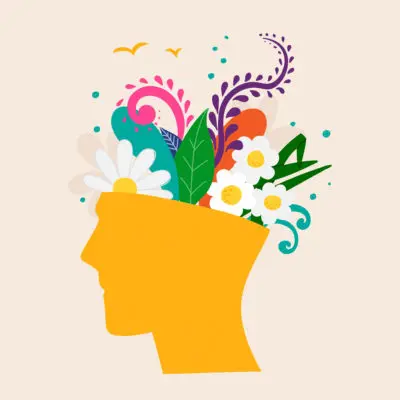Medical Editor: Dr. David Cox, PhD, ABPP
The most breakthrough depression treatment in recent years is the use of ketamine. But can it also treat anxiety? Nearly one-half of people with depression also experience anxiety. Emerging ketamine research suggests that it could treat both mental health conditions at the same time. However, more research is needed on ketamine for anxiety before it goes mainstream. When considering seeking ketamine treatment for anxiety, it is important to learn about the existing research, how ketamine works, and how to safely obtain treatment.
What Is Ketamine?
Ketamine is a substance that has an extensive history. While it has been embraced as a psychedelic medicine in recent years, ketamine is technically a dissociative anesthetic. It was discovered in 1956 and approved in 1970 as an anesthetic agent derived from phencyclidine. Ketamine was used extensively in battlefield settings, most notably in Vietnam. This medicine maintains hemodynamic stability, or stable blood flow, which is crucial when treating physical trauma.
Ketamine is listed on the World Health Organization Model List of Essential Medicines, which names medications considered the most effective and safe while meeting a health system’s most important needs. It’s still used as anesthesia in medical and trauma settings, such as hospital emergency rooms. Because of its dissociative and euphoric effects at sub-anesthetic doses, it is also a popular recreational and party drug. While used under medical supervision, ketamine is relatively safe. When it is used recreationally, on the other hand, there is the risk of mis-dosing or obtaining adulterated supply. Chronic ketamine use can lead to urinary tract symptoms, including cystitis, and serious bladder issues. As a result, ketamine has to fight against its party reputation to be taken seriously as a medicine. And, in recent years, striking evidence has emerged for use of ketamine in mental health care.
Ketamine For Anxiety
The majority of the mental health research on ketamine explores its use for depression. In March of 2019, the FDA approved ketamine, in the form of the nasal spray Spravato (esketamine), for treatment-resistant depression. While Spravato is the first ketamine product to gain FDA approval, there is substantially more research that supports the use of generic (racemic) ketamine to treat depression through off-label use infusions. A 2017 study suggests that ketamine infusions administered intravenously one to three times per week are the quickest and most effective treatment for depression.
Anxiety is often a comorbid condition with depression, and there is evidence that ketamine may also help treat anxiety. A 2017 study of 18 adults with Social Anxiety Disorder (SAD) found that ketamine treatments showed a significantly greater reduction in anxiety relative to the placebo. Furthermore, the ketamine was well-tolerated in all participants. Over 12% of Americans will experience social anxiety disorder at some point in their lives.
“I did not realize how high my anxiety was until I received my first ketamine infusion. I came home and experienced what an anxiety-free state of mind was and felt a huge sense of relief. Placing the Default Mode Network offline seems to allow the mind to take the pause it needs to allow anxiety to move through. At least for me,” wrote one Reddit user on a thread about ketamine for anxiety.
How Does Ketamine Work?
Ketamine is technically an anesthetic with psychedelic properties. While more research is needed to fully understand ketamine’s mechanism of action, evidence suggests that it works by exerting complex pharmacological actions, including inhibition of biogenic amine uptake, binding to opioid receptors, and inhibition of N-methyl D-aspartate (NMDA) receptors. Further studies show that ketamine may downregulate the default mode network (DMN) and treat anxiety and depression by normalizing the interaction between the DMN and salience networks.
In particular, ketamine may help patients with treatment-resistant anxiety. It is estimated that one-third to one-half of patients with SAD do not respond to evidence-based treatment such as pharmacotherapy with selective serotonin reuptake inhibitors (SSRIs) or venlafaxine in conjunction with cognitive-behavioral therapy (CBT).
Not only does this create the potential for ketamine to step in where other methods fall short, but there may be a harm reduction benefit. When ketamine is used recreationally, it may be addictive. However, it is worth noting that other commonly prescribed medications for anxiety, like benzodiazepines, are far more addictive. While growing research indicates that ketamine is a safe treatment for anxiety, especially in cases comorbid with depression, one study suggests that some people not only fail to respond (or have poor reactions) to ketamine therapy, but they also have worsening anxiety. This indicates that not only is more ketamine research needed to address anxiety disorders, but doctors at ketamine clinics should vet their potential clients more thoroughly to better sort out those who are at risk for having a poor (or paradoxical) reaction.
Final Thoughts and Conclusions
Ketamine, particularly intravenous generic racemic ketamine, shows promise in treating anxiety. There is research-supported evidence that it can help with social anxiety disorder, and several studies on ketamine for depression also indicate a reduction in anxiety symptoms. However, more research is needed, and one study shows ketamine treatment actually increased anxiety in those whose depression symptoms did not improve. Because ketamine is also a popular recreational drug with potentially addictive side effects, it should only be used to treat anxiety in a medically supervised setting. Furthermore, ketamine treatment centers should be diligent in their patient screening process to ensure that the benefits outweigh the potential harm.








